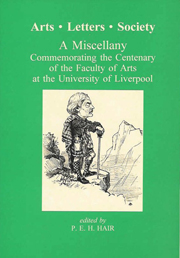4 results in Liverpool Historical Studies

Yellow Jack and the Worm
- British Naval Administration in the West Indies, 1739-1748
-
- Published by:
- Liverpool University Press
- Published online:
- 05 January 2012
- Print publication:
- 01 April 1993
-
- Book
- Export citation

Arts - Letters - Society
- A Miscellany Commemorating the Centenary of the Faculty of Arts at the University of Liverpool
-
- Published by:
- Liverpool University Press
- Published online:
- 26 October 2011
- Print publication:
- 01 December 1996
-
- Book
- Export citation

Black Poor and White Philanthropists
- London's Blacks and the Foundation of the Sierra Leone Settlement 1786-1791
-
- Published by:
- Liverpool University Press
- Published online:
- 26 October 2011
- Print publication:
- 01 June 1994
-
- Book
- Export citation

Oliver Lodge and the Liverpool Physical Society
-
- Published by:
- Liverpool University Press
- Published online:
- 26 October 2011
- Print publication:
- 01 June 1990
-
- Book
- Export citation

